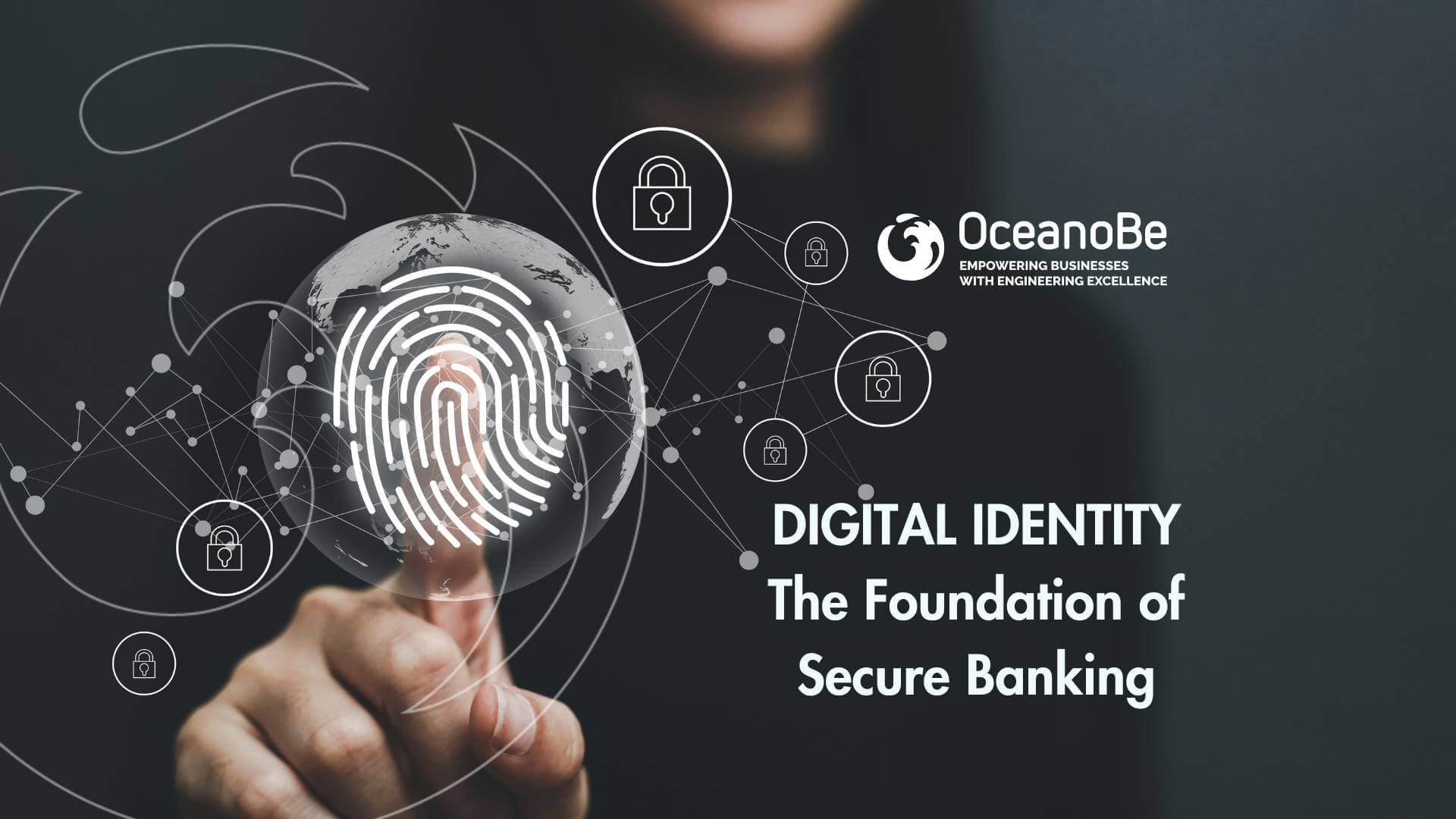Digital Identity
The Foundation of Secure Banking
The Foundation of Secure Banking

At OceanoBe Technology, we help financial institutions architect and implement digital identity frameworks that meet regulatory requirements, enhance security, and provide a frictionless user experience.
The digital banking landscape is evolving rapidly, and at its core lies digital identity—a crucial element that ensures security, trust, and seamless financial interactions. As banks and financial institutions face increasing risks of fraud, cyber threats, and regulatory scrutiny, the need for robust digital identity solutions has never been greater.
At OceanoBe Technology, we help financial institutions architect and implement digital identity frameworks that meet regulatory requirements, enhance security, and provide a frictionless user experience. In this article, we explore the role of digital identity in banking, key regulations driving its adoption, the latest technologies enabling secure authentication, and best practices for implementation.
In an era where cyber threats are at an all-time high, verifying customer identities securely and efficiently is no longer an option—it’s a necessity. Digital identity in banking provides:
Fraud Prevention & Security – Strong digital identity systems mitigate identity theft, unauthorized access, and account takeovers by verifying users through advanced authentication methods.
Regulatory Compliance – Banks must comply with strict Know Your Customer (KYC) and Anti-Money Laundering (AML) regulations that require strong identity verification.
Seamless Customer Experience – A well-implemented digital identity system reduces friction in banking transactions while maintaining high security standards.
Operational Efficiency – Automating identity verification reduces manual processing, improves accuracy, and speeds up customer onboarding.
Open Banking Enablement – Secure digital identity is the foundation of PSD3 and Open Banking, ensuring safe financial data sharing between banks and third-party providers.
A strong digital identity infrastructure enables banks to enhance trust, comply with regulations, and stay ahead in the competitive financial landscape.
Financial institutions must align with various regional and global regulatory frameworks to ensure compliance and security. Some of the most critical regulations include:
PSD3 & FiDA (Financial Data Access Regulation) – Strengthens authentication requirements and mandates secure digital identity for Open Banking.
eIDAS 2.0 (Electronic Identification and Trust Services Regulation) – Establishes a European framework for secure digital identity, enabling cross-border authentication.
GDPR (General Data Protection Regulation) – Ensures that digital identity data is collected, stored, and processed securely, emphasizing user consent and data protection.
KYC & AML Directives – Require financial institutions to verify customer identities rigorously before onboarding and during transactions.
Banks that fail to comply with these regulations risk hefty fines, reputational damage, and security breaches. Implementing a scalable and compliant digital identity framework is essential to mitigating these risks.
To secure digital identities, financial institutions must leverage advanced authentication technologies that go beyond traditional usernames and passwords. Some of the key technology enablers include:
1. Biometrics (Fingerprint, Facial Recognition, Behavioral Authentication)
How It Works: Uses unique biological traits to authenticate users securely.
Implementation in Banking: Mobile banking apps and ATMs now support biometric authentication to prevent unauthorized access.
OceanoBe’s Approach: We integrate biometric SDKs (Software Development Kits) into banking applications, ensuring seamless authentication.
2. AI & Machine Learning for Fraud Detection
How It Works: AI analyzes user behavior, detecting anomalies in login patterns or transaction requests to flag potential fraud.
Implementation in Banking: AI-based risk scoring helps banks prevent fraudulent transactions without impacting legitimate users.
OceanoBe’s Approach: We can ensure a smooth integration of AI-driven fraud detection systems with digital identity solutions to offer real-time threat mitigation.
3. Identity Verification APIs & SDKs
How It Works: Secure APIs verify user documents (passports, national IDs) against government databases.
Implementation in Banking: Used for remote onboarding and account verification processes.
OceanoBe’s Approach: We implement real-time identity verification APIs that enable fast and secure onboarding.
4. Blockchain for Decentralized Identity
How It Works: Enables users to control their digital identities without relying on centralized databases.
Implementation in Banking: Used for secure digital IDs and self-sovereign identity (SSI).
OceanoBe’s Approach: While we don’t focus on blockchain, we integrate decentralized authentication methods that align with banking security standards.
Building a secure and scalable digital identity framework requires strong technical expertise. Here’s how banks and financial institutions can ensure a successful implementation:
Adopt a Multi-Layered Authentication Approach – Combine biometrics, AI-driven risk analysis, and multi-factor authentication (MFA) to maximize security.
Ensure Compliance with Global Standards – Align with PSD3, eIDAS, GDPR, and KYC/AML regulations to avoid legal risks.
Leverage AI for Risk-Based Authentication – AI-driven fraud prevention solutions can dynamically adjust authentication requirements based on risk level.
Implement Seamless API Integrations – Use secure identity verification APIs to streamline customer onboarding while reducing friction.
Enhance User Experience (UX) – A digital identity system should be secure yet frictionless, ensuring customers can authenticate themselves quickly and conveniently.
At OceanoBe Technology, we provide end-to-end solutions that help banks integrate digital identity seamlessly into their platforms.
The implementation of digital identity solutions requires deep technical expertise, strong security measures, and seamless system integrations.
OceanoBe Technology specializes in:
✅ Custom Digital Identity Solutions – Tailored for financial institutions to meet PSD3 and eIDAS compliance.
✅ AI-Driven Authentication – Integrating machine learning models for fraud detection and risk-based authentication.
✅ Biometric Authentication Development – Implementing fingerprint, facial recognition, and behavioral biometrics for secure banking.
✅ API & SDK Development – Providing custom authentication APIs that integrate seamlessly with banking infrastructure.
💡 Ready to upgrade your digital identity framework? Contact OceanoBe Technology for a tailored solution that ensures compliance, security, and a seamless customer experience. 👉 Let’s talk!